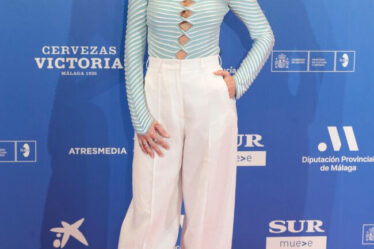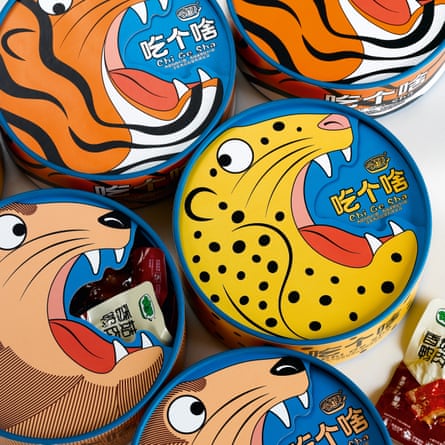
Though architect studio Apparata missed out on the 2023 Stirling Prize, it’s great to see A House for Artists win a RIBA award for affordable housing. Read more about this sensational design in this month’s news.
Kids get laughed at for playing with the box rather than the toy they’ve just pulled out of its packaging, but appreciation for nice presentation never really fades. Of course, that delight is dampened by the current climate crisis. The harm to species and the environment caused by plastic is at an all time high. The sheer volume of packaging waste is mind blowing. In the UK alone, 2.2m tonnes of plastic packaging enters the consumer market every year.
So it’s affirming to see new The Package Design Book, a collection of all the 2021/22 winners of the Pentawards competition. These global awards for packaging look for innovations that are sustainable as well as stylish. The judging panels includes experts from the World Wide Fund for Nature as well designers for Pentagram. Packaging honoured in this beautiful art book includes everything from perfume to cat food – all of it looks as good enough to play with.
The Packaging Design Book (Taschen) is out now
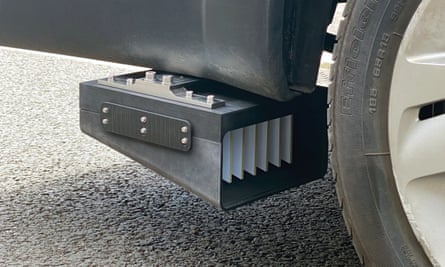
Designing for the Real World was the title of educator and designer Victor Papanek’s groundbreaking 1971 book which showed how socially and ecologically responsible design could have a radical impact on the way we live. This November, Somerset House uses the same name for its exhibition celebrating the 10th anniversary of the Makerversity, a community of over 300 designers who work in the Thameside building.
The aim of the Makerversity is to develop ground-breaking solutions for the world’s biggest challenges, such as climate change, health and inequality, and many of the projects on show here will make you feel better about the future. There’s work by The Tyre Collective, who uses electrostatics and airflow to reduce microplastics shed onto roads by tyre wear and tear. There’s work by El Warcha, a Tunisian collective that makes temporary urban furniture to promote civic gatherings and social actions, and Amphibio, a 3D-printed garment which functions as a gill designed for a future where humans live underwater.
If these inventions fire you up, the exhibition will also feature the workshop of the future – a project space fitted with state-of-the-art machinery, where new innovations will be created for the first time in front of exhibition visitors. Paul Smyth, director and co-founder of Makerversity, is proud the group has endured to mark its 10-year celebration. He says: “We are part of bringing the life-changing power of making back into the hands of millions of people, leading to a resurgence in the role of design, inventing and creating the tools for a better world.”
Makerversity: Designing for the Real World is at Somerset House from 1 November – 4 February 2024
3
Prize-winning public housing
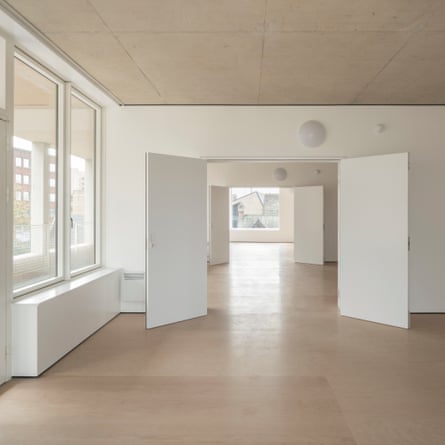
London-based architecture practice Apparata has won the Neave Brown Award for the UK’s best affordable housing at the RIBA Awards. The prize was for A House for Artists, a co-housing block of flats in Barking.
As well as 12 apartments across five floors, A House for Artists has a glass-walled community hall and outdoor exhibition space at street level. Long-term leases are set one-third below market rate, but residents must participate in community-focused activities such as art classes to qualify. The aim of A House for Artists was to create social housing that was comfortable and inspiring. Even though the apartments are at the national minimum space standards for housing, they feel much larger because of a clever design that keeps all corridor and walkway space to the sides of the building.
Apparata was founded in 2015 by Astrid Smitham and Nicholas Lobo Brennan. The Manor Park-based studio designs buildings, furniture and books – as they say: “Tools for everyday life that open up unknown possibilities.”
At a time when affordable housing is so hard to find, the success of A House for Artists is particularly heartening. “Home is not simply a box to live in,” says Smitham. “A decent, intelligently designed home is the foundation of health, community and social wellbeing. This can be done affordably and efficiently, as with this project – there’s no excuse for bad housing.”
after newsletter promotion
4
Electric bike with a difference
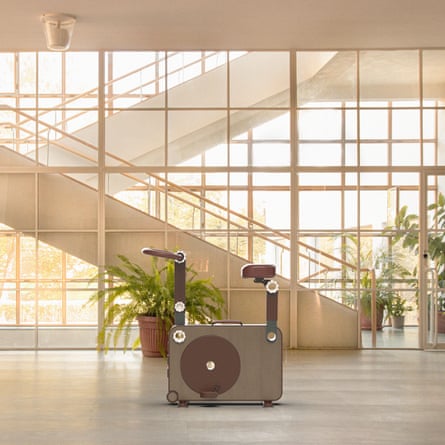
In times of natural disaster and war, power supply often breaks down at the time it becomes most crucial. A new exercise bike developed by Turkas EV, a Lithuanian company looking into clean mobility solutions, could provide one way round this.
HR Bank looks like a classic exercise bike, but it can generate from 50 to 300W/h of electricity by pedalling. The energy can be stored in a battery of 2 kWh, the amount of electricity needed to keep a light on for a week. The bike can be customised to fit the user’s capabilities and is easily transportable because of its trolley-style wheels.
Jonas Navickas, CEO of Tukas EV and co-creator of the bike, says the war in Ukraine was one of the stimuli to create HR Bank: “When the bombing of Ukraine’s infrastructure started, I was shocked by the sight of people with many extension cords trying to get electricity from one power generator to charge their phones.”
Add to that the various floods and natural disasters around the world – from the American ice storms in the spring, the deadly floods in South America and Africa, and the wild fires in Greece – and kit to produce energy starts to look extremely sensible.
And in quieter times, you can use it to do a bit of cardio.
For more details, contact Turkas EV
5
A history of black creatives

Charlene Prempeh co-founded the creative agency A Vibe Called Tech to celebrate black creativity. It was during a brainstorming session with podcaster Chrystal Genesis and A Vibe Called Tech co-founder Lewis Gilbert that she discovered she hadn’t known that a black designer – Ann Lowe – had created Jackie Kennedy’s wedding dress. This led Prempeh down a rabbit hole of self-education to find out the names of other black creatives who don’t get the credit they deserve. Unsurprisingly, she quickly found out there were enough of them to fill a book, so that’s what she’d written. The results of her research are published this month as Now You See Me – An Introduction to 100 Years of Black Design. The book looks at the fields of fashion, architecture and graphic design and Prempeh tells the stories of such greats as Hilyard Robinson, one of the architects who designed the first state-funded housing estate in Washington DC; or Jackie Ormes, the first African American woman to have a newspaper comic strip. She looks at how these black creatives reclaim tradition, use their work as a form of protest and what it means to be a black designer, particularly in the western world. The book is an enthusiastic hymn to how these incredible names have helped shaped modern design. As Prempeh says: “What their work and trajectories provide is a feeling of hope, the sense that things are moving and that at some point Black people – designers or otherwise – might have the freedom and space to really be seen.”
Now You See Me by Charlene Prempeh (Prestel) is out now



